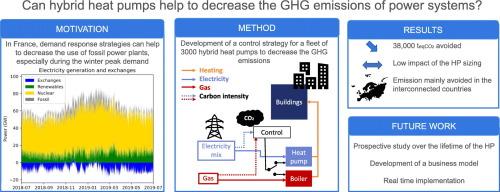Development of a GHG-based control strategy for a fleet of hybrid heat pumps to decarbonize space heating and domestic hot water
IF 10.1
1区 工程技术
Q1 ENERGY & FUELS
引用次数: 0
Abstract
In Europe, the building sector accounts for approximately 35 % of the energy-related emissions. Hybrid systems coordinating heat pumps and gas boilers can avoid greenhouse gas (GHG) emissions from carbonized electricity production by providing demand-side flexibility without any service interruption. This work aimed to develop a control strategy for a fleet of hybrid heat pumps to reduce GHG emissions. The electricity and gas consumption of a fleet of 3000 hybrid heat pumps, heating 100,000 dwellings spread throughout France, was evaluated. A Modelica model of a district archetype was simulated in seven cities representative of the French climatic zones to obtain the national heating demand. The marginal emission factor of the electricity consumption was assessed using a French power system model coupled with marginal emission factors for interconnected power systems, which were assessed through linear regressions. Two types of control strategies (prioritizing the heat pump and fuel switch) are evaluated considering 4 different sizing for the heat pump (120 %, 50 %, 35 %, and 20 %). Between July 2018 and June 2019, a strategy prioritizing the heat pumps would have avoided between 8000 and 26,000 tCO2eq for the power system. A strategy switching between the heat pump and the boiler based on the marginal emission factor of the electricity consumption would have avoided around 38,000 tCO2eq, with a limited influence of the sizing of the heat pump.

为混合热泵机组制定基于温室气体的控制策略,以实现空间供暖和生活热水的去碳化
在欧洲,建筑行业约占能源相关排放的 35%。协调热泵和燃气锅炉的混合系统可以在不中断服务的情况下提供需求方灵活性,从而避免碳化电力生产所产生的温室气体排放。这项工作旨在为混合热泵机组开发一种控制策略,以减少温室气体排放。我们评估了由 3000 台混合热泵组成的机组的电力和天然气消耗量,这些热泵可为分布在法国各地的 10 万个住宅供暖。在七个代表法国气候区的城市中模拟了一个地区原型的 Modelica 模型,以获得全国的供热需求。电力消耗的边际排放系数是通过法国电力系统模型和互联电力系统的边际排放系数进行评估的,后者是通过线性回归进行评估的。考虑到热泵的 4 种不同规格(120%、50%、35% 和 20%),对两种控制策略(优先使用热泵和燃料转换)进行了评估。在 2018 年 7 月至 2019 年 6 月期间,优先使用热泵的策略可为电力系统减少 8000 至 26000 吨二氧化碳当量。根据电力消耗的边际排放系数在热泵和锅炉之间切换的策略可避免约 38,000 tCO2eq 的排放,而热泵的大小影响有限。
本文章由计算机程序翻译,如有差异,请以英文原文为准。
求助全文
约1分钟内获得全文
求助全文
来源期刊

Applied Energy
工程技术-工程:化工
CiteScore
21.20
自引率
10.70%
发文量
1830
审稿时长
41 days
期刊介绍:
Applied Energy serves as a platform for sharing innovations, research, development, and demonstrations in energy conversion, conservation, and sustainable energy systems. The journal covers topics such as optimal energy resource use, environmental pollutant mitigation, and energy process analysis. It welcomes original papers, review articles, technical notes, and letters to the editor. Authors are encouraged to submit manuscripts that bridge the gap between research, development, and implementation. The journal addresses a wide spectrum of topics, including fossil and renewable energy technologies, energy economics, and environmental impacts. Applied Energy also explores modeling and forecasting, conservation strategies, and the social and economic implications of energy policies, including climate change mitigation. It is complemented by the open-access journal Advances in Applied Energy.
 求助内容:
求助内容: 应助结果提醒方式:
应助结果提醒方式:


